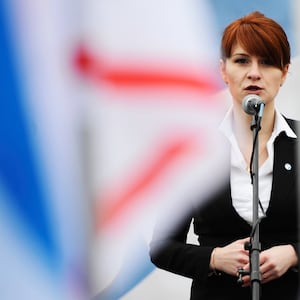Federal prosecutors are asking a judge to give Russian agent Maria Butina 18 months in prison while her lawyers are pushing for a sentence of time-served so she can return to her homeland and “start her life anew.”
In sentencing memos filed Friday night, the government and defense attorneys presented dueling sketches of the gun-slinging, flame-haired Russian who cozied up to powerful American conservatives.
She pleaded guilty in December to conspiring to violate laws prohibiting covert foreign agents and promised to cooperate with American law enforcement. She is scheduled to be sentenced April 26.
Prosecutors described her as a politically-savvy schemer who sought to advance Russian interests and establish a back channel between Moscow and influential figures in Washington.
“Butina was not a spy in the traditional sense of trying to gain access to classified information to send back to her home country. She was not a trained intelligence officer,” they wrote.
“But the actions she took were nonetheless taken on behalf of the Russian Official for the benefit of the Russian Federation, and those actions had the potential to damage the national security of the United States.”
Her lawyers, by contrast, portrayed her as a naive country girl who came to the United States for love and opportunity and made a bureaucratic mistake—failing to register as a foreign agent while she reported back to a former Russian official, Alexander Torshin, about her activities.
They described how she started and built a gun-rights organization, made contact with the National Rifle Association, started a romance with Republican operative Paul Erickson, and then moved to the U.S., where she admittedly did Torshin’s bidding.
“If given a chance, she would have done things differently,” her attorneys wrote.
But, they added, “all told, her motivations weren’t nefarious. Maria was genuinely interested in improving relations between the two countries, and she had no ill intent.
“Additionally, if Torshin happened to share any of her unsolicited notes or political thoughts up the chain, she didn’t know, although she would welcome any recognition all the same.”
The attorneys said that Butina has fully cooperated with the U.S. investigation, turning over thousands of documents to a Senate committee, answering the committee’s questions for eight hours, and sitting for interviews with federal investigators before and after her guilty plea.
They asked the judge to give her a sentence of no more than six months; since she’s been jailed for nine months, that would amount to a sentence of time served—along with a one-way ticket to Russia.
Prosecutors acknowledged Butina’s cooperation and said they were willing to cut her a break, asking for a six-month downward departure in the sentence. Instead of the 24 months called for in the guidelines, they argued, she should get 18 months.
“Butina’s work involved building a rolodex of and information about powerful people who had, or were likely to get, access to and influence over the next presidential administration,” the U.S. attorney’s office wrote.
“Butina’s reports back to the Russian Official on the people she was meeting have all the hallmarks of spotting-and-assessing reports. The value of this information to the Russian Federation is immense.”
Butina’s memo included a sheaf of character references including one from George O’Neill, the Rockefeller heir and conservative writer who reportedly hosted a U.S.-Russian “friendship dinner” at her behest in 2017.
He called her a “delightful and idealistic young soul” and suggested that her efforts at diplomacy might not be over.
“I expect with the spiritual strength gained from this painful and unhappy episode in her life, she can continue working to enable peaceful answers to some of her vexing international problems,” he wrote.







